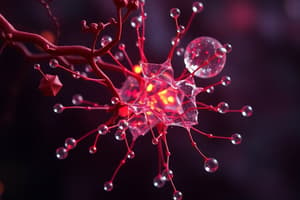Podcast
Questions and Answers
What is the primary aim of science?
What is the primary aim of science?
- To validate preexisting beliefs
- To explore supernatural concepts
- To understand natural phenomena through empirical evidence (correct)
- To create theories without experimentation
Which of the following is NOT a branch of physical sciences?
Which of the following is NOT a branch of physical sciences?
- Ecology (correct)
- Chemistry
- Physics
- Astronomy
What is the first step in the scientific method?
What is the first step in the scientific method?
- Reporting
- Observation (correct)
- Analysis
- Hypothesis
Which statement best describes a scientific theory?
Which statement best describes a scientific theory?
What is one of the current trends in science?
What is one of the current trends in science?
What significance does ethics hold in scientific research?
What significance does ethics hold in scientific research?
Which of the following is NOT a concern of earth sciences?
Which of the following is NOT a concern of earth sciences?
What role do variables play in an experiment?
What role do variables play in an experiment?
Flashcards are hidden until you start studying
Study Notes
Definition of Science
- Systematic study of the natural world.
- Involves observation, experimentation, and analysis.
- Aims to understand natural phenomena through empirical evidence.
Branches of Science
-
Physical Sciences
- Physics: Study of matter, energy, and their interactions.
- Chemistry: Study of substances, their properties, and reactions.
- Astronomy: Study of celestial objects and the universe.
-
Life Sciences
- Biology: Study of living organisms and life processes.
- Ecology: Study of interactions between organisms and their environment.
- Genetics: Study of heredity and variation in organisms.
-
Earth Sciences
- Geology: Study of the Earth's structure, processes, and materials.
- Meteorology: Study of the atmosphere and weather patterns.
- Oceanography: Study of oceans and marine ecosystems.
-
Formal Sciences
- Mathematics: Study of numbers, quantities, and shapes.
- Computer Science: Study of computation and information systems.
-
Social Sciences
- Psychology: Study of behavior and mental processes.
- Sociology: Study of human society and social behavior.
- Anthropology: Study of human cultures and societies.
Scientific Method
- Observation: Gathering data and noting phenomena.
- Hypothesis: Formulating testable explanations.
- Experimentation: Conducting tests to validate or refute hypotheses.
- Analysis: Interpreting data and drawing conclusions.
- Reporting: Sharing findings with the scientific community.
Importance of Science
- Advances technology and medicine.
- Informs policy-making and environmental protection.
- Enhances understanding of natural and social phenomena.
Key Concepts
- Theory: A well-substantiated explanation of an aspect of the natural world.
- Law: A statement based on repeated experimental observations that describe some aspect of the world.
- Variables: Factors that can change in an experiment (independent, dependent, controlled).
Current Trends in Science
- Interdisciplinary research combining various scientific fields.
- Emphasis on sustainability and environmental science.
- Growth of AI and data science in research methodologies.
Ethical Considerations
- Importance of ethical standards in research practices.
- Issues include animal testing, human subjects, and environmental impact.
- Scientific integrity and transparency are crucial for public trust.
Definition of Science
- Systematic exploration of the natural world to seek understanding.
- Employs observation, experimentation, and analysis as core methodologies.
- Utilizes empirical evidence to explain natural phenomena.
Branches of Science
-
Physical Sciences
- Physics: Investigates matter, energy, and their interactions.
- Chemistry: Examines substances, their properties, and chemical reactions.
- Astronomy: Focuses on celestial bodies and the universe's structure.
-
Life Sciences
- Biology: Explores living organisms and their life processes.
- Ecology: Studies the relationships between organisms and their environments.
- Genetics: Investigates heredity, genetic variation, and inheritance.
-
Earth Sciences
- Geology: Analyzes the Earth’s composition, structure, and processes.
- Meteorology: Studies atmospheric conditions and weather phenomena.
- Oceanography: Examines oceanic systems and marine life.
-
Formal Sciences
- Mathematics: Concerns numbers, quantities, shapes, and their relationships.
- Computer Science: Focuses on algorithms, computation, and information technology.
-
Social Sciences
- Psychology: Investigates behavior, thoughts, and emotions.
- Sociology: Studies human interactions and societal structures.
- Anthropology: Explores cultural practices and human societal evolution.
Scientific Method
- Observation: Initiates the process by collecting data on phenomena.
- Hypothesis: Develops testable predictions based on initial observations.
- Experimentation: Conducts controlled tests to confirm or challenge hypotheses.
- Analysis: Interprets experimental data to draw conclusions.
- Reporting: Communicates findings to the broader scientific community.
Importance of Science
- Drives advancements in technology and healthcare.
- Informs public policy and environmental conservation efforts.
- Deepens insights into both natural and social phenomena.
Key Concepts
- Theory: A comprehensive explanation of a natural phenomenon based on substantial evidence.
- Law: A consistent statement derived from repeated observations describing a natural aspect.
- Variables: Elements in an experiment that can vary, categorized as independent, dependent, or controlled.
Current Trends in Science
- Encouragement of interdisciplinary collaboration across scientific domains.
- Rising focus on sustainable practices and environmental science.
- Increasing integration of artificial intelligence and data science within research methodologies.
Ethical Considerations
- Necessity for ethical standards throughout research processes.
- Key issues encompass animal testing, studies involving human subjects, and impacts on the environment.
- Maintaining scientific integrity and transparency is essential for fostering public trust.
Studying That Suits You
Use AI to generate personalized quizzes and flashcards to suit your learning preferences.




